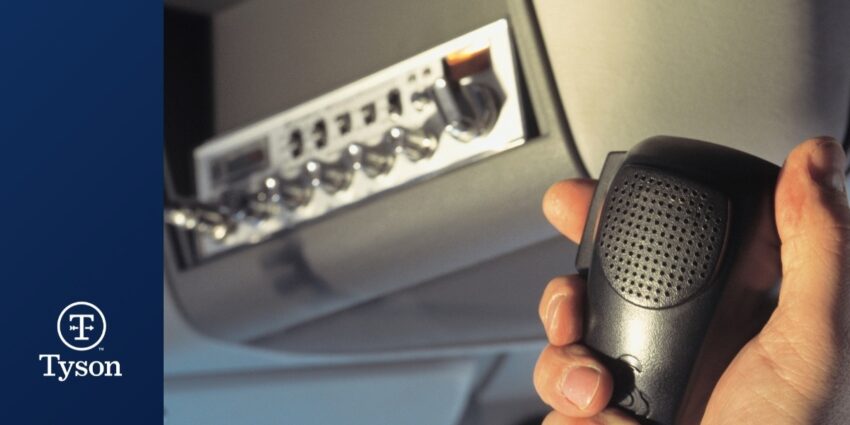
CB Radios still used by many truckers – a look back at the lingo
Post Date - Aug 20, 2022
With the widespread use of smart phones, cell phones and electronic logging devices, truck drivers have plenty of tech at their fingertips to replace the old CB (citizens band radio). However, many truckers keep CBs in the cab for those times when they go out of network coverage or travel to remote areas with slow internet. That’s when their cell phones become useless and the CB can keep you connected.
CB history & current usage
The Federal Communications Commission (FCC) created the CB radio service in 1945 and designated a portion of the radio spectrum for personal communication. Unlike cell phones, CBs can only be used over short distances, meaning dispatchers cannot rely on them to stay in touch with drivers. There is also an issue with security and privacy. CB radios operate on public frequencies, meaning anyone can tune in and listen.
CB radios can still allow drivers to communicate with other trucks nearby, providing comforting chatter and stimulating conversation. As we mentioned, when cell service is out, CB radios can be used to get updates on traffic, roadblocks, and weather reports. CB radios are also crucial in emergency situations when communication infrastructure may be damaged, which is why emergency responders often use them during disasters. Drivers can get assistance if there is a mechanical breakdown or medical emergency, even when their cellphone isn’t working.
CB Lingo
The language, abbreviations and codes used on CBs is a huge part of the fun of using one. Have you heard of these words or phrases in your career?
- Breaker 1-9: There are many channels for truckers on the road but two of the most popular are channel 17 and channel 19. While channel 17 is most commonly used by truckers on North/Southbound highways on the west coast, channel 19 is famous for being the center frequency of the band for truckers. This phrase equates to asking permission before you begin speaking on the channel.
- Smokey Bear: Police or DOT officer. Anyone who’s ever seen the movie Smokey & The Bandit, knows this one – and if you haven’t seen the movie, you need to! Along with this is the phrase Feeding the Bears, which means paying a traffic ticket.
- Alligator: Also called a "gator", is a piece or pieces of tire on the road that can be dangerous if hit by your vehicle causing damage to hoses, belts, radiators, vehicle body, etc. or to other vehicles if you hit the gator and it bounces up. The pieces can look similar to an alligator, hence the name. Don't let it "bite you"! Small pieces are called baby alligators. Several small pieces are called alligator bait.
- Anteater: The Kenworth T-600 truck has a sloped aerodynamic hood. It is also called an aardvark.
- All Locked Up: Closed weigh station.
- Bedbugger: Household moving company.
- Brake Check There is traffic congestion ahead where you will need to slow down or come to a stop.
- Brush Your Teeth and Comb Your Hair: A law enforcement vehicle is radaring vehicles.
- Bull Hauler: A livestock or cow hauler.
- Bundled Out: A vehicle that is fully or over loaded or is at maximum capacity.
- Come Back: If you couldn't hear the last transmission or want the other driver to talk, you can ask for a comeback.
- Go-Go Juice: Diesel fuel.
- Got My Nightgown On: A driver is in their sleeper and is getting ready to go to sleep.
- Got Your Ears On?: Are you listening?
- CB Handle: Your CB nickname. Although not required, they are encouraged and can be fun too!
- Having "Shutter Trouble": Having difficulty keeping your eyes open or staying awake.
- Hundred Dollar Lane, High Dollar Lane: Describing a traffic lane where trucks are prohibited from driving. There can be high fines for trucks driving in these prohibited lanes (typically the far left lane).
- In My Back Pocket: A location that you've passed. "It's already in my back pocket."
- Lollipop: The road reflector poles or marker poles with reflectors, often on the side or median of the highway.
- Mud Duck: A weak radio signal.
- Pay The Water Bill: Going to the bathroom.
- Salt Shaker: A maintenance vehicle that pours sand or salt on roadways in the winter months.
- Thermos bottle: A tanker trailer.
- Through the woods: Exiting the Interstate to travel on secondary roads.
- Throwin' iron: Putting chains on the tires
- Toothpicks: A load of lumber.
- Walked on you: Talked over you by transmitting at the same time.
- Yardstick: A mile marker located on the highway.
If you’re looking to feed your future with an industry leader, there’s only one way to say it: Tyson’s private fleet has outstanding CDL-A truck driver jobs! Connect with us today to learn more about the opportunities we have for you.